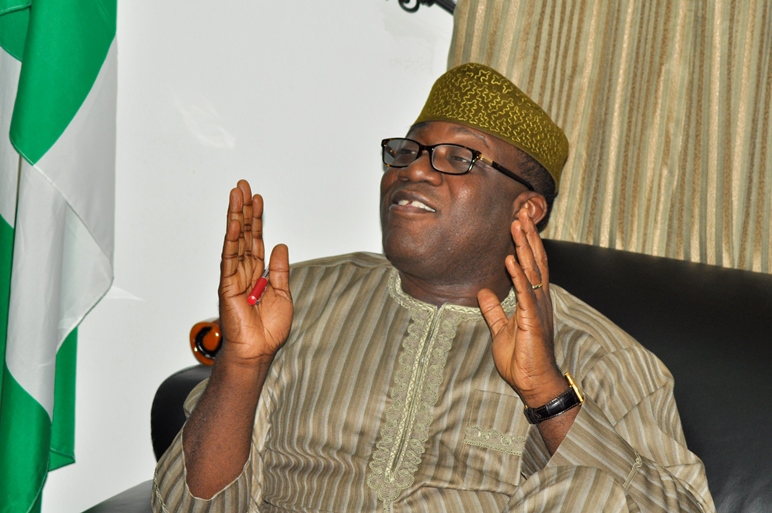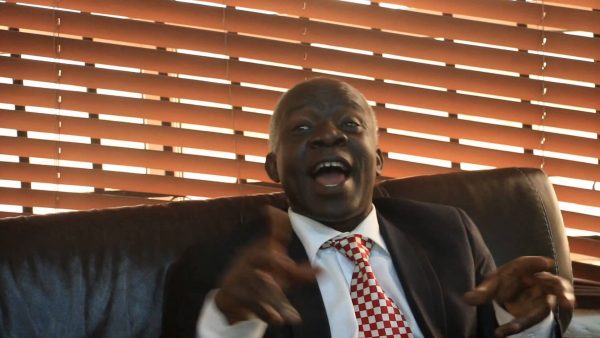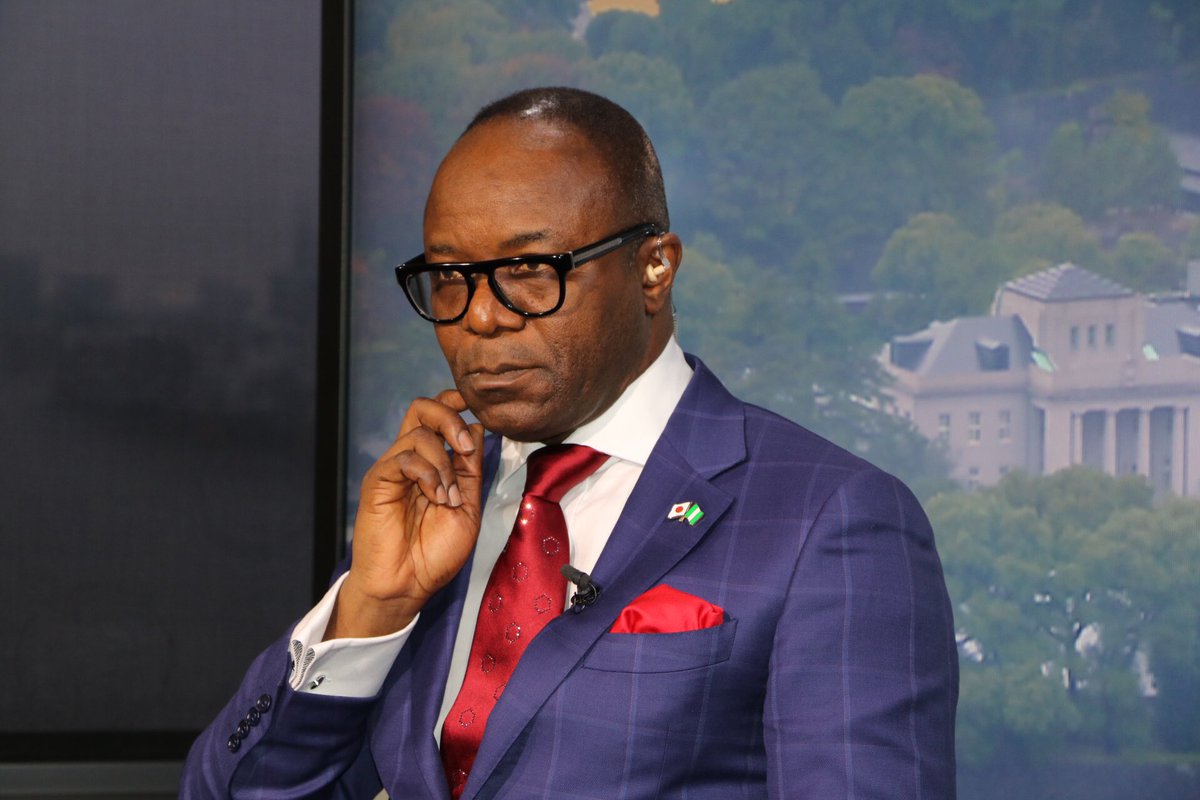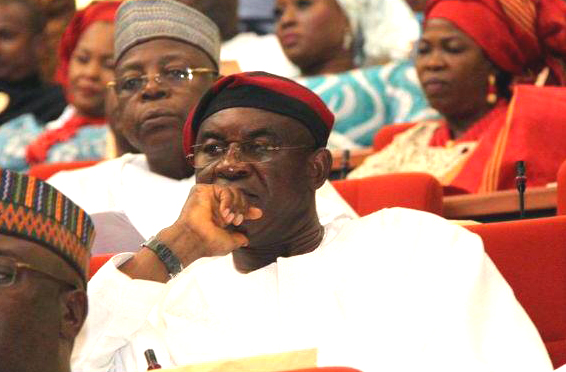????????????????????????????????????
The minister of mines and steel development, Kayode Fayemi, PhD, is full of hope and expectation that Nigeria’s solid minerals are finally going to take their place of pride with the groundwork that has gone into the sector in the last two years. He also speaks on his rumoured governorship ambition in Ekiti state, where he was governor from 2010 to 2014, as well as his other duties in government.
TheCable: Nigeria is rich in mineral resources. Every state is blessed with solid minerals. Why are we still at this stage of solid mineral development? Why are we still talking about crude oil contributing about 90% of our forex earnings?
Fayemi: This is actually the crux of the matter, but you will also recall that solid minerals used to contribute about four to five percent of our GDP, up till the 60s because we prioritised our focus on the solid minerals. If you look at the various works done by the geological survey of Nigeria then, you would see that the concentration paid off, and we became top ten producers of tin in the world, we became the major producer of coal to the world. In fact we had recorded trade in gold at the time, and then we discovered oil. And everything went pear-shaped, notably the 1973 oil embargo that led to the steep rise in the price of oil. I think we became a very unfortunate victim of the Dutch disease or what is now popularly known as the resource curse. Everything revolved around that mono-product, all the things that we used to be good at, our productive and manufacturing capacities which were fledgling at the time just went comatose.
But when I came to this ministry, one of the first questions I asked was the same question you asked. I said director-general, Nigerian Geological Survey Agency, please give me concrete evidence of quantity, quality and commercial viability of these endowments that we often talk about. Yes, we have a gold belt we have a coal belt, etc., and it was at the end of that exercise that we decided to concentrate on seven mineral titles that are proven as being in commercial quantity: bitumen, gold, coal, limestone, barites, lead-zinc and tin. And that was what our roadmap sets out to do. That is not to say that if we discover something in substantial commercial quantity different from those seven, we will ignore it. In any case, this is supposed to be a purely private sector-driven initiative.
Advertisement
However, in a country where the perception has been that we are an oil and gas nation, not a solid minerals nation, government needs to put in a level of commitment that would then attract the average investors to put in their money into the sector, and that is basically what has informed the policy, the governance framework that we have introduced to the industry, the regulatory reforms that were put in place, even the fiscal regime around mining, like the incentives as well as the geo data focus that we have. And flowing out of that are artisanal and small scale mining strategy because there are the bulk of the players in the field, and our value addition strategy in terms of the processing plants, the beneficiations, the smelters. In fact, I had a meeting with a gold buying network, because for too long we cannot even put a finger on what we produce, yet Nigeria is a gold-bearing nation.
People are selling gold daily in Nigeria, but we don’t have a record of what is being sold, and these are the kind of issues that we think we need a proper framework to begin to address. So your concern is legitimate that we all talk about it, but what does it mean. Unfortunately, mining is a long-term sector. It is not a quick win that the average citizen wants the government to produce. What are you people doing? We have not seen anything and so on. Unfortunately for us the mining cycle and the electoral cycle are not perfectly aligned. The electoral cycle is four to five years; the mining cycle is 20 years. To do a successful exploration alone takes an average of five to six years of intensive capital expenditure, and when you now do that, to move from exploration to production takes you another three to five years before you start seeing the result. And yet, people don’t have that patience; they don’t have that level of finance that is required.
We have now decided that some of the things that we would be doing would also necessitate even reintroducing a government holding company. We used to have a Nigerian Mining Corporation in the past, which went away with the privatisation agenda. But we have come to a point now of restarting a mineral holding company that can now take some of the assets have been languishing in the BPE because of lack of interest from people who would ordinarily pick them up and develop them. So we need to change strategy, we need to shift focus, we need to remove regulation from the ministry and let it be independent so that confidence can increase and we need to ensure that the work of the ministry is more along the line of policy, research, investment promotion and we leave regulation to an independent agency.
Advertisement
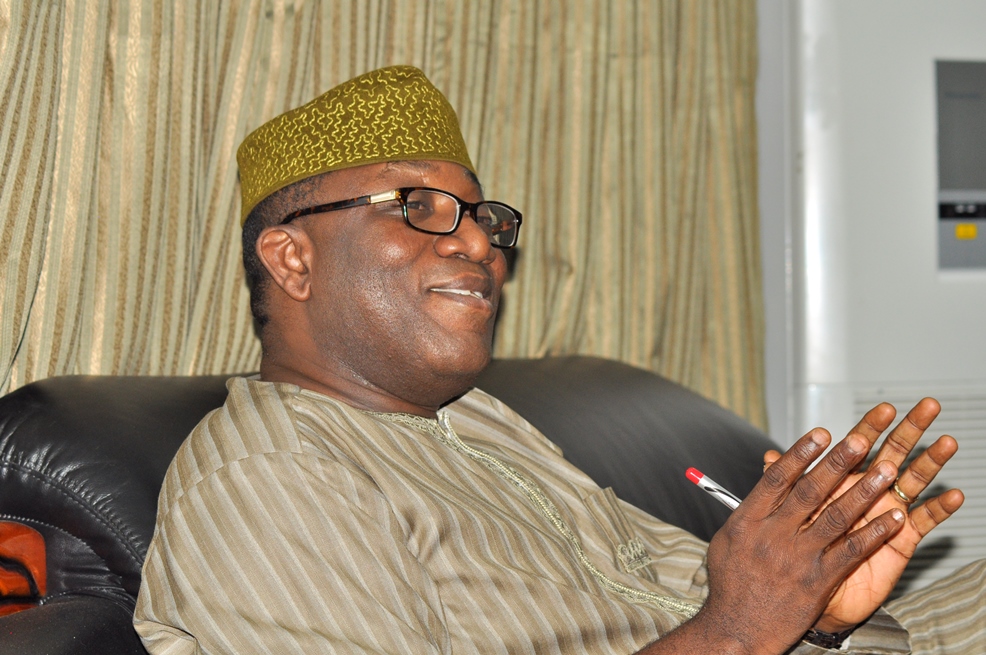
While we try to formalise our artisans and small-scale miners by supporting them with finance, technical equipment, with capacity building that would give them a sense of eking out a living rather than criminalizing them because it is so easy to say, oh, illegal miners everywhere. But when somebody is mining in his backyard, his ancestral land, and you say he doesn’t have a licence from Abuja, it takes some getting used to, because the man would look at you and say what is he talking about, me I’m from Share here, we have tourmalin here, and it is on my father’s land, they say I have to go to Abuja to get a licence in order to mine what is on my father’s land. We must come to terms with the tradition and the intersection of tradition and modernity, and also work on this federalist contradiction that has bedeviled our economy.
TheCable: How do you bring illegal miners into a formal system so that you can know the quality and quantity of what people are mining?
Fayemi: What we have decided to do is to help them form cooperatives, particularly at the artisanal level and ensure that what they get out of their efforts is received by mineral buying vehicle. So it is like an off-taker. For example, if you are mining gold, let your cooperative give the gold to a gold buying centre and you get the exact value that you get on the London metal exchange for it, rather than a discounted rate that a middleman takes it from you and you really are grateful for being cheated because you do not know any better. That is one level.
The second level is we also need to carve out some areas for artisanal miners to legitimately mine and provide them with facilities, particular equipment beyond the diggers and shovels that people are using and mercury that is poisoning their lives. That is the second level. For that we set up a N5 billion fund that we put in the Bank of Industry and set criteria for them to access these funds in the hope that once you access these funds, you automatically formalise because we will take information from you before we give you the money and you begin to work with other colleagues. We are doing this with the Miners Association of Nigeria and the Bank of Industry so that we can also create a level of support. When you take the money, you need support to get the equipment either from leasing company or as operations cost for your quarry, something to give you a sense that government does care about a thriving mining industry and there is a support base for it. It’s going to take a while because roughly 80% of the people in the industry are artisanal and small scale. But it could also be our greatest vehicle for job creation if we get it right because you have more people in mining than in oil and gas, making a living out of mining. In almost every single part of the country, they are there.
Advertisement
TheCable: Where does the revenue from these mining activities go to?
Well, the legitimate revenue, the royalty, and the fees also come to the federation account. However, what we have done because of the clamor for effective sharing of that revenue is to introduce the 13% derivation to this sector as well. Whatever is mined from a state, the state is entitled to derivation. If small scale miners produce and take to the mineral buying centers, that is formal but if they don’t, it is underground economy, we cannot monitor it.
TheCable: Where are we now?
Fayemi: We have put in place the framework. The roadmap was approved in 2016 by the federal executive council, and that roadmap looks at the governance of the sector, it looks at the strategy for enhancing the mining industry, it looks at policy, it looks at the regulatory framework, and it also looks at the fiscal regime like: what do we charge? What is the withholding tax in the mining sector? A whole load of detailed work had gone into that. We have also prioritized beneficiation so most of the people who are coming in now, we are encouraging them to go into processing because part of the challenge in the sector and why it has remained rudimentary is that most of what people get is taken out raw. There is no value addition, and we are not even getting the best, yet we have high-quality minerals in Nigeria.
Advertisement
I just had a meeting with some bitumen prospectors who are working for bitumen for oil as well as bitumen for asphalt for road construction. They came up with a report from Canada that that particular asset that they have somewhere in the Agbadu area of Ondo state is the highest grade bitumen they have seen anywhere in the world, even than in Canada. So we have these things but it is important that we get all of the parameters working. We can’t even test in Nigeria because it requires an ISO standard before it is taken seriously by any independent accessor outside. So we are now working with the SGS, the mineral inspection company, to revive our laboratory in Kaduna and bring it up to ISO standard, so that people can test minerals here in Nigeria, rather than keep taking them out to Australia, Canada and a whole lot of other places. Some private companies are setting up small testing plants. PW Nigeria has just set up one here in Abuja, but you need quite a number around the country because the minerals are in far-flung places.
We are also working on the enablers, transport. You can’t do mining without transportation and one of the things we have done was to engage with the ministry of power, works and housing, as well as the ministry of transportation to ensure that they have a picture of our strategic plan, so that that can inform in what they are doing in terms of road construction to mining communities, in rail line development particularly the central line where we deem to be the mineral corridor in the country, which is the Itakpe, Ajaokuta, Abuja, Kaduna and Nasarawa axis of the country. So those are the critical areas that the framework touches on, the governance of the sector, the strategy for enhancing the operations, the government policy in the sector, fiscal regime we have worked on, the regulatory framework we have worked on, in fact, I have taken to the Federal Executive Council, an amended bill that now creates a Nigeria Minerals and Mining Commission, which is in the mould of a Nigerian Communications Commission (NCC) or the Nigerian Electricity Regulatory Commission ( NERC).
Advertisement
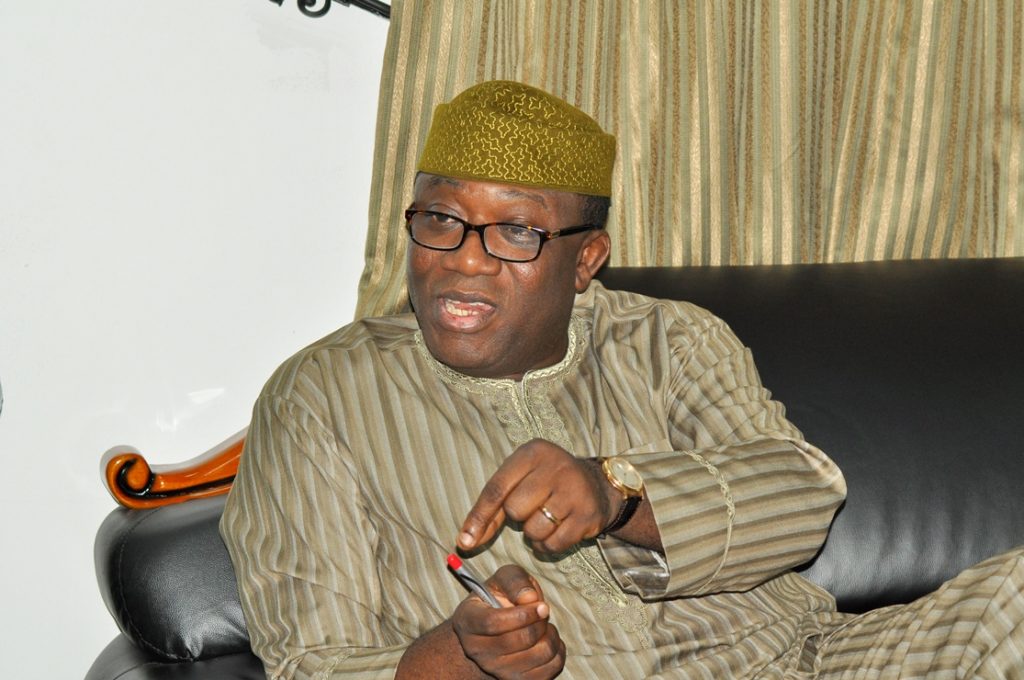
We have also worked on the value addition. So many of the players by December 2018 would have a bitumen processing plant in Ondo state. That much we have confidence on, given the work we have done there, and it is all private sector-driven. We have also worked on the enablers, particularly the infrastructure enablers. Mining is wholly dependent on power, and freight, access and on ensuring that all of the various enablers can come together to support the necessary work that is required in the mining sector. So all of these are contained in the roadmap for the sector. We have also worked on the perception to the point that Nigeria is now climbing up on the ratings index as a mining destination. There is a standard index that is used for that, it is called Fraser’s index, and we were nowhere in Fraser’s index in times past. So these are some of the things that we are doing, and they are not tangible or direct benefits that people can see, and it is going to take a while. That is why I made the point earlier about the mining and electoral cycles that are not aligned.
TheCable: Even the oil sector, to produce oil takes a while…
Advertisement
But I think we have got it right in oil because we have been doing it for so long and the private sector is fully involved in it. We have also ensured that the Mining and Minerals Act that we currently have is a good law but the enforcement has been a little bit unimpressive, so that is an area we are working on. We don’t want you to keep your licence at home. Once we give you licence, we want you to show evidence that you are working, that you are exploring and you must submit a report. We ensured that the “use or lose” principle that is contained in the law is effectively enforced, so if you don’t use, you lose. We regularly now publish revocation orders in the newspapers. We also don’t particularly do anyone any favors as long as you follow the laws and the due process, you have us an ally in the sector.
TheCable: Which state is the richest regarding mineral in Nigeria?
Advertisement
Fayemi: Well, if you go by current earnings, Kogi, Ogun and Plateau states are doing a lot better than all the other states.
TheCable: What about regarding potential?
Regarding potential, by the time the bitumen processing plants begins in Ondo, and tin is on the rise in the international market and there is a lot private sector initiative on Tin. The gold belt, Zamfara, Kebbi, Niger, and Osun are also on the rise, and there are interesting developments that are coming up there by way of solid gold initiatives. These are medium-scale initiatives, not small-scale or artisanal that we believe are going to give us a lot of leverage. Then lead-zinc is also on the increase, and of course, you know the transition that the world is experiencing from fossil fuels to battery powers, renewable energy, those are the things that are going to power the economy. That is something I also think we need to pay attention to. States like Ebonyi, Plateau, and Nasarawa are very rich in tin and tantalum, and these are things that are increasingly becoming attractive to the international minerals market.
TheCable: Which is the biggest minerals deposit in Nigeria?
Fayemi: Again, it is difficult. We have mineral maps for all the states. I would have to say that the tin deposit is large, coal deposit is also significant, the bitumen deposit is also quite large and then the lead and zinc. Of course, limestone is significant, we are doing very well in that, we have become self-sufficient, and we are now exporting cement in that respect, so industrial minerals are quite impressive, but agro-minerals and energy minerals are also doing well.
TheCable: What state are we now in Ajaokuta?
Fayemi: Iron ore is one of the seven priority minerals, and it is also because iron ore is the backbone of any economy. You can’t do manufacturing without steel and what we have had to deal with in the case of Ajaokuta was a legacy of litigation. The Obasanjo administration concessioned it, the Yar’Adua administration came in and revoked it, the concessionaire took the federal government to the international arbitration, we got out of that with a modified agreement which we are now implementing. The basic component of the modified agreement is that the federal government which has never lost ownership of Ajaokuta… but because of the legal nature of the concession, for the period that it was concessional, it was supposed to be in the legal custody of the concessionaire. So we retrieved Ajaokuta legally speaking and not formally speaking. And as part of that agreement, we were to allow the concessionaire to finish the remaining part of their concession in order to gain full access to Ajaokuta and as part of that deal, they are also supposed to give Ajaokuta operator the first right of refusal for every iron ore coming out if Itakpe because it is more of dual joint initiative. The iron ore supply comes from Itakpe; the production line is in Ajaokuta and the Delta steel in Aladja. So that is where it is. And right now we are moving into the reconcessioning phase because for us, government is not willing to spend any additional money on Ajaokuta. We are quite convinced that the way to go is to give it to somebody who has the technical capacity, who has the financial capability and the track record to make it work first by completing it and secondly by ensuring that it produces liquid steel.
We are producing steel in Nigeria, but the steel we are producing is largely from scrap metals, and there is a major market in scrap metals in Nigeria. It has gone up now to N400,000 per tonne, because there are so many of the local companies that are scrambling for the scrap to feed their plants in order to produce some of the things you see around, like the billet,s the iron rod and not all of them are produced to standard. That is why we have the collapsed building incidence. But the challenge is we also suffer from a glut of imported steel, so the local market is seriously affronted by this. The local producers are suffering from the influx of imported steel, particularly, from China. Although that is reducing now.
TheCable: Why is it reducing?
Fayemi: It is because steel is being shut out. For example, 600% tariff is placed on steel import from America because they have a local steel industry that is also suffering. And even in China, the tariff has gone up, so it pays you to produce and use locally than to produce and take out. Here we have a few producers who are even beginning to export to the African market. We produce about one million metric tonnes, and we export about 350,000 to Morocco and Ghana. So you have a glut even though our market is almost an eight million metric tonne market and because construction has gone down significantly in Nigeria. However, construction is picking up because this is one government that has done well in infrastructural development. One-third of our capital budget is going largely into construction. And inevitably, steel is being required by many of the companies.
Mining sector is a big beneficiary of the huge budget you see in the ministry of power, works and housing because a lot is going into our quarries and others. So a way we have gone about addressing it is one, find a way to protect the local industry by not banning imported steel, but by making it more expensive for those who want to bring it into the country. So there is a 12% levy on imported steel into the country, and that is supposed to end up in a steel fund that is warehoused at the central bank to support the local industry. Just as we have the cement fund, we have the steel fund.
TheCable: Is this a new development?
Fayemi: It is not a new development. It is just that we are aggressive about how that fund goes into supporting the sector. It is like the Natural Resources Development Fund. It has always been there, we have always been identified as a beneficiary, and the solid minerals sector has always been identified as a beneficiary of the Natural Resources Development Fund from the federation account. But until President Muhammadu Buhari came into office, we didn’t benefit anything from that fund. I think it had more to do with the political will and the commitment of the leadership and that was what we are enjoying now. But that is even a peanut. We have been given N30billion, out of which we have accessed about N10billion. Mind you, N30 billion is only about $100million. It does not carry out one exploration activity on a serious scale. So it is a hugely capital intensive sector.
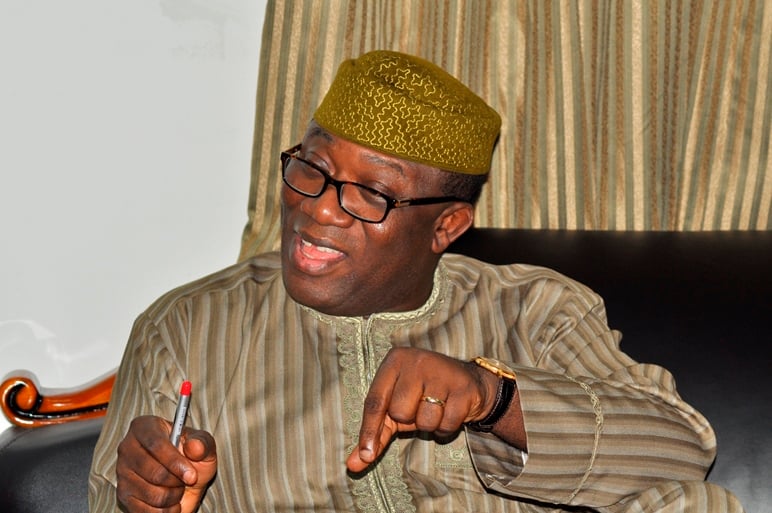
TheCable: Are you running for the governorship in Ekiti state in 2018?
Fayemi: I am still on duty.
TheCable: But a probe has indicted you in Ekiti, so maybe that is a sign of something coming up from your side as per 2018?
Fayemi: Probe report? I think that is a question better directed at those constituting the probe panel. For me I am busy, I am working. What I do has never really been on account of ambition. It is more to do with duty and sacrifice and if it happens to be the case, that is another job, and I would consider the request to look in that direction. But for now, I am fully occupied and busy.
TheCable: I am saying this because July 2018 is just seven months away and you do not have all the time in the world. Does silence mean consent?
Fayemi: (Laughs)
TheCable: How do you cope as chairman of the Nigeria Extractive Industries Transparency Initiative (NEITI) and the inter agency task team on corruption?
Fayemi: In all of these places I am really fortunate in the sense that I have a set of officials that are truly dedicated. In NEITI, I have an excellent hand, Waziri Adio, there as executive secretary. You couldn’t have asked for a better person. He is dedicated to the job, creative in his ways and he has introduced many new initiatives that have made NEITI more relevant to everyday Nigerians than it was initially envisaged to be. So for me, it is not much of hard work to supervise people who are already doing the right thing.
And in the ministry, I also have a great partner in my minister of state and the permanent secretary who supervises the really dedicated team. It just means that I have to do more reading of files, take up more roles, public speaking engagements on behalf of these various initiatives. I am sure the president has a reason for asking me to take up these roles apart from my primary assignment, and there is quite some interconnectedness. NEITI is about the extractive industry. The ministry that I superintend is about the extractive sector. The intergovernmental task team on corruption is something that is a passion. For me, this is a government that came on the pedestal of anti-corruption and high integrity, and I consider it a rare privilege being asked to supervise the institutional initiatives on strengthening anti-corruption because part of the challenge that we have encountered is that some of these things are what we pay lip service to, not the institutional focus that it requires.
TheCable: BUA recently wrote an open letter to the president accusing your ministry of colluding with Dangote to attack them with militants. What is really the problem?
Fayemi: I really don’t know what informed the attack on my person and the ministry by Alhaji Abdul Samad Rabiu. Whatever it is, it is unfortunate. Our role in the ministry is purely regulatory. The ministry had acted purely on the basis of the records in our custody by stating that the legal owner of a specific mining area is Dangote Plc. BUA disagrees with that position and he has taken the matter to court which is his right. However, he cannot eat his cake and have it. You cannot get a free pass for illegal mining. And we have said pending the determination of the matter in court, we have a duty to protect the investors known to law. He has also chosen to write a petition to my boss. My boss is a stickler for due process and I’m sure he will send the petition to me for my comments. Until then, the less said the better.
TheCable: By the time we begin to refer to you as the former minister of solid minerals development, what do you want Nigerians to remember you for?
I want Nigerians to remember me as the person who brought the mining sector back to relevance, doing this by ensuring that our backward integration strategy, our value additions strategy, our regulatory framework, our support for artisanal and small-scale miners and our overall governance framework represent an impetus to those who want to come and invest in the sector and give confidence to both external players and local entrepreneurs.
